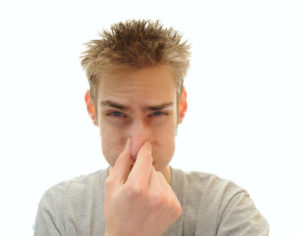Why Does My Chimney Stink?
As we head into another hot and humid Austin summer, you may start to notice stinky smells coming into your home through the fireplace from the chimney. At Atlas Chimney, we get calls every summer from customers asking why their chimneys stink so badly, and we are here to help the Austin area with keeping their homes smelling fresh and sweet during the hottest months of the year. We have been dealing with stinky chimneys for over 25 years, and we know what the most common chimney odor sources are. Although the unpleasant chimney odors are entering your home because of draft issues (which we can take care of for you, too), the source of these smells can be several things inside your chimney. We would like to tell you a bit more about why your chimney stinks and how we can help solve this smelly problem.

Do you smell bad barbecue or asphalt?
If the odor smells like a grilling disaster or a road crew paving, the source of your chimney odor is soot and creosote. These byproducts of combustion can accumulate into large deposits over the winter when you use a wood-burning fireplace, stove, or insert. As the weather gets warmer, the scent of creosote and soot gets stronger. Not only is creosote stinky, the Chimney Safety Institute of America (CSIA) names it as the main cause of chimney fires. The best way to get creosote and soot out of your chimney is to have a professional chimney sweeping. Atlas Chimney agrees with the CSIA that every chimney needs to be swept and inspected annually. Scheduling an appointment with our CSIA-certified chimney sweeps in the spring or summer will not only reduce your risk of a chimney fire, but you will also be protected from smelling creosote and soot in your home.
Is the odor a rotting, decomposing smell?
When you do not have a chimney cap professionally installed on top of your chimney, you have an open hole that allows water, leaves, sticks, and other debris to fall easily down into your chimney. If you are noticing a musty, dirty, and decomposing smell, the odor source, is a mixture of standing water on the smoke shelf, which is mixed with leaves, dirt, and other debris. Unfortunately, birds, bats, squirrels, raccoons, and other wild animals can also easily get into uncapped chimneys, and these critters can become trapped and die inside the flue. If you have noticed chirping, scratching, and other animal sounds a the smell is a strong rotting and decomposing odor, the source is probably a dead bird or animal in your chimney. To keep everything out of your chimney and protect your home from invasions of water, birds, and other wild animals, Atlas Chimney offers our professional chimney cap and animal covers, sales and installation services. Even if you already have a chimney cap on your chimney, it could be damaged if it has been there for years, so our CSIA-certified chimney experts can check out its condition during the annual inspection and sweeping to see if it needs replacing to keep your chimney and home safe.
Summer is the best time to schedule your annual chimney sweeping and inspection with Atlas Chimney! Contact us today to easily arrange a visit from our CSIA-certified chimney sweeps on the date that is the most convenient for you with no waiting
